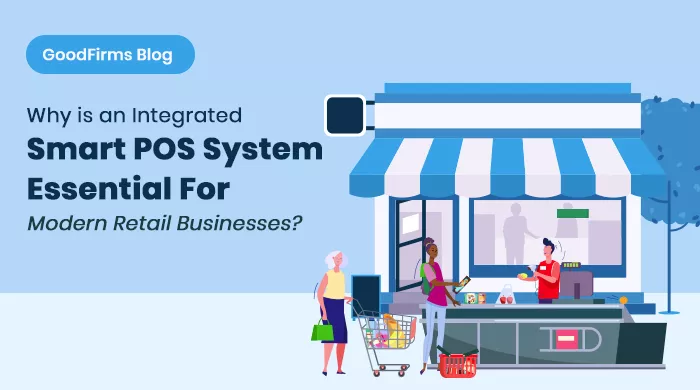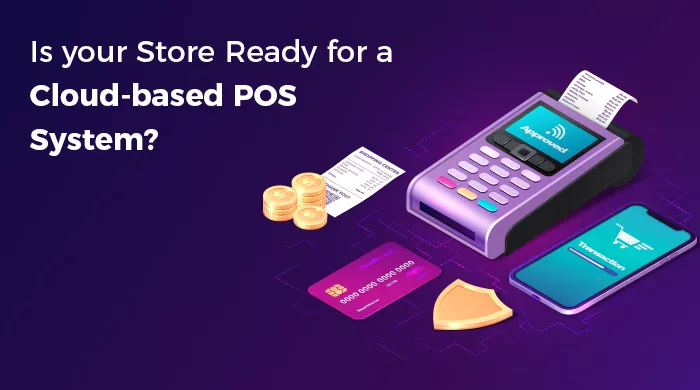POS (Point of Sale) system is a perfect combination of software and hardware components that allow retail businesses to collect payments from their customers for their purchases. Besides collecting payments, POS software solutions are also used for tracking inventory, managing returns and refunds, and generating reports that provide a comprehensive view of valuable customer insights, product information, financial data, marketing campaigns, and more on a real-time basis.
Advancements in wireless connectivity, computing power, and data storage are key drivers transforming how retail businesses operate these days. As retail stores are experiencing a surge in online sales after the pandemic, they require building innovative capabilities to align with modern and tech-savvy consumers' changing behavior. Currently, in this mobile-driven world, consumers prefer collecting information, shopping, and paying anytime. Also, retail businesses have moved to multichannel selling, so the need to manage larger databases and online & offline transactions has increased.
Thus, in this digitally transforming business world, retailers require modern AI-based, IoT-powered POS software that can integrate with other systems to manage other organization processes, like inventory, marketing, finance, customer service, and more.
The Internet of Things, aka IoT, is one of the many brewing technologies that has opened the door to new possibilities and advancements for many industries. IoT refers to the system of devices connected to the internet and communicating with each other. IoT-enabled devices, including smartphones, wearables, smart home appliances, and many other industrial smart equipment, have drastically changed how people work, shop, learn, and entertain themselves. Integrating IoT into POS systems has enabled retail businesses to deliver better customer experiences and sustain the competition.
This article covers complete information about IoT-powered POS systems and lists ten ways these next-generation systems revolutionize retail businesses.
What is an IoT-Powered POS System?
An IoT-integrated POS system helps brick-and-mortar stores collect payments from anywhere in the store because of its wireless connectivity. Besides that, it allows online and physical retail stores to track and update the inventory, gain customer insights, and analyze market conditions enabling them to make business decisions leading to the growth of the business.
The IoT-powered POS system goes beyond the traditional stand-alone POS system. It assists the staff with their tasks and enhances their overall productivity. At the same time, it enables businesses to deliver an exceptional shopping experience to customers. With the increasing and swift usage of IoT-powered POS systems, recent reports estimate that by 2025, more than 75 billion IoT-connected devices will be in use.
Some of the best and most popular features of IoT-enabled POS systems include-
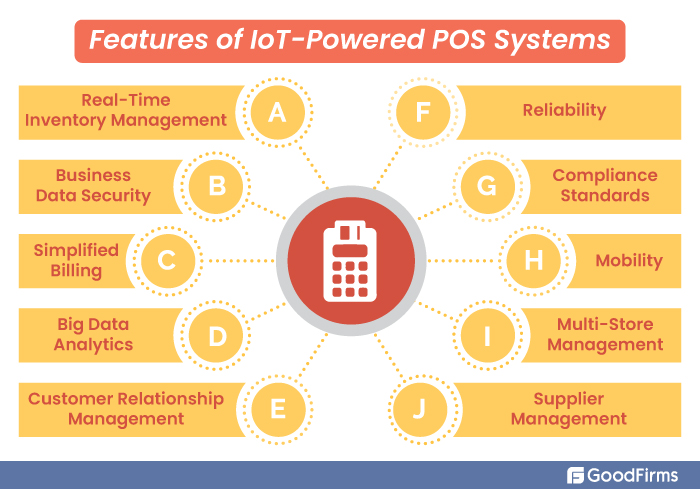
Real-Time Inventory Management
The IoT-powered POS system keeps track of the stock stored in stores and warehouses. Every time a product sale or return occurs, it automatically updates the inventory and gives you real-time insights into the same.
Business Data Security
Maintaining the security of customers' data is essential to provide secure shopping experiences, gain customers' trust, and improve loyalty. With the implementation of a smart POS system, all the information gets stored in the cloud with high-end security, preventing hacking and malware activities.
Simplified Billing
Customers need not waste their time standing in queues to make payments. The IoT-powered POS system allows accepting different modes of payments that can be processed anywhere in the store.
Big Data Analytics
With the prominent data analytics feature offered in IoT POS systems, businesses can make intelligent decisions with the offered insights. Retailers can generate blueprints for marketing strategies, PR, customer relationships, and other aspects of the businesses that drive up sales. The in-built feature of generating reports presents real-time data that enables retailers to take steps to improve performance.
Customer Relationship Management
The IoT-powered POS system includes CRM software features that helps in maintaining accurate customer information at every stage of their journey. This enables you to implement strategies that can provide secure shopping experiences and build customer loyalty.
Reliability
An IoT-powered POS system offers consistent and strong connectivity with other systems within the retail business. It helps in preventing downtime errors, saving time, and ensuring enhancement in the shopping experiences provided to the customers.
Mobility
The future of POS systems is evolving with the latest mobile payment methods. The IoT-powered POS system comprises mobility features that are backed with 5G connectivity which eventually leads to a faster and more personalized customer experience. For example, an IoT-enabled restaurant POS software enables you to collect payment from the customer from the place they are seated.
Compliance Standards
The IoT-based POS systems follow the security and compliance standards like Payment Card Industry Data Security Standard (PCIDSS) that will give security to the customer. It guarantees personal customer data, card information, and purchase history in an encrypted form. This makes it safe for customers to carry out transactions at ease.
Multi-Store Management
Many POS software offers the facility of managing multiple stores. If the central shop changes the price, products, or any other changes, it automatically gets updated in other store chains. This feature is handy, especially for franchises or multiple retail chains. A robust feature like multi-store management reduces the workload and brings the innovative work facility into the frame.
Supplier Management
The POS system gives you the track record of the purchases sent to the suppliers. It gives you insight and updates regarding any purchases the shop carries out directly into the POS system. Additionally, the supplier purchases blend with the inventory management that helps plan your order whenever the stock goes out or gets returned.
Important Components of IoT-Powered POS System in Retail Business
Below are the components of an IoT Powered POS system in the retail industry.
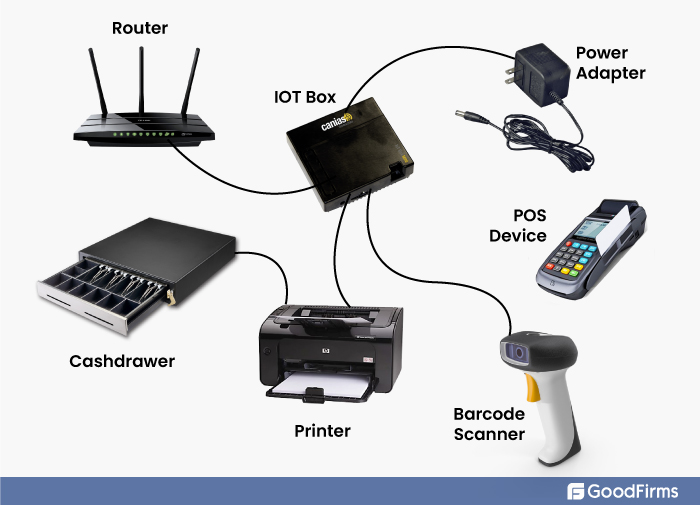
POS Software - the software that will run on the device, enabling them to scan items, reports, and manage customers. All of these are with a single tap on the device.
Computer/Tablet/iPad - A personal device backed up with data that helps perform all sorts of functions and update the data on other necessary platforms like CRM, inventory management, and more.
Barcode Scanner - A device directly connected with the inventory management system, it updates the inventory count when the item is sold or returned.
Cash Drawer - A cash drawer is essential for storing cash, receipts, or vouchers.
Wireless Card Machine - An internet/Bluetooth-powered handy machine connected with a computer/tablet/iPad to perform the credit/debit transaction while purchasing the goods.
Receipt Printer - The printer that is used to give the receipt upon the purchase of the products. It gives them the transaction details about their purchases.
QR Scanner - A device that is used to conduct online payment transactions through e-Wallets
Network Devices - Includes devices like WiFi router that helps in linking POS systems with the internet.
Each of these components requires adequate attention and service through frequent updates. In unwanted scenarios, one can contact an IT professional for a checkup.
How Does an IoT Integrated POS Work for the Retail Business?

With the help of an IoT-powered POS in retail, one can complete transactions from anywhere in the store. This will prevent the long waiting queue during peak hours. The IoT integrated POS system updates the inventory as soon as the product goes out of stock.
IoT integrated POS is all digital, making it convenient for customers and staff members to carry out tasks. It requires a strong internet connection and an IoT-enabled device with the software.
Now, let's have a look at how an IoT-powered POS system is different from a traditional POS system.
IoT-powered POS System VS Traditional POS System
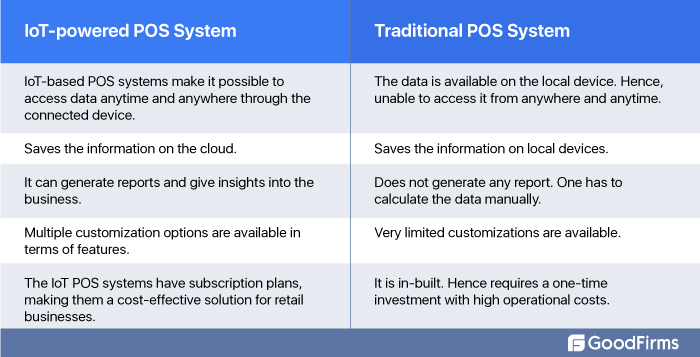
Types Of IoT Integrated POS Systems
Mobile POS
Mobile POS systems run on devices like iPad, tablets, or smartphones. It is also known as iPad POS software, Android POS, or Mobile POS. The consumer can collect and process payments from anywhere. It is an excellent potential for businesses that operate on the go and do not require many employees to maintain the inventory. The staff can update the shelf from any location. This improves convenience and reliability among the customers and employees.
Touch Screen POS Systems
In recent years, touch screen POS systems have enhanced faster workflow and inventory management. With the touch screen POS, the payment process is smooth. Customers can swipe the card safely and quickly check out the products. Additionally, business owners can track down which employees worked and for how many hours. Investing in a touch screen POS system shows your customers that you are using the latest and easy-to-use technology for the business and improving the customer experience.
Cloud POS Systems
The cloud POS systems store all your data on third-party servers remotely. It's similar to saving or accessing files on iCloud or Google Drive. The integration of the cloud POS system with your business brings a heap of benefits. For instance, businesses can maintain sales records and inventory. A cloud POS system will also regularly generate reports to give you business demographics and insights that help plan the marketing strategy.
Multi-Channel POS Systems
A multichannel POS system allows businesses to sell their products in-store and online through a centralized program. The Multi-channel POS system offers many benefits like integrated inventory management, providing the latest reports, secure information accessibility, 24x7 online customer support, cloud management, and payment processing. Regardless of your business size, deploying a Multi-Channel POS system can benefit you in the long run.
Self-Service POS Systems
With the implementation of a self-service POS system, the customers can select the products at the tap on the screen and proceed toward the payment method without standing in a long queue and without the cashier's assistance. The latest features will give you customer analysis, inventory management updates, an easy payment process, and customer service. It is relatively inexpensive and hence worth having for your business. As per market growth reports, the self-service market was valued at USD 21.2 billion in 2022, which is bound to reach USD 45.3 billion by the end of 2028.
Real-Life Examples of IoT-Enabled POS Systems
As mentioned earlier in the article, intelligent POS systems are more than just payment processing tunnels. It gives you collective insights into the customers' data, retail history, and business insights.
Carrefour Pay
Carrefour - the world's second-largest retailer by revenue, has launched a smart integrated POS system known as Carrefour Pay. It enables customers to pay for their purchases by just waving their smartphones at their POS terminals.
IoT Module in Odoo 14
Odoo 14 includes a module designed to make use of IoT boxes that connect with printing, shipping labels, weighing packages, and other integration devices that connect to the platform. This integration is helping businesses to monitor their sales, returns, and inventory and driving better data availability. This ultimately leads to better decision-making and business growth.
How Does IoT-Powered POS Revolutionize the Retail Business?
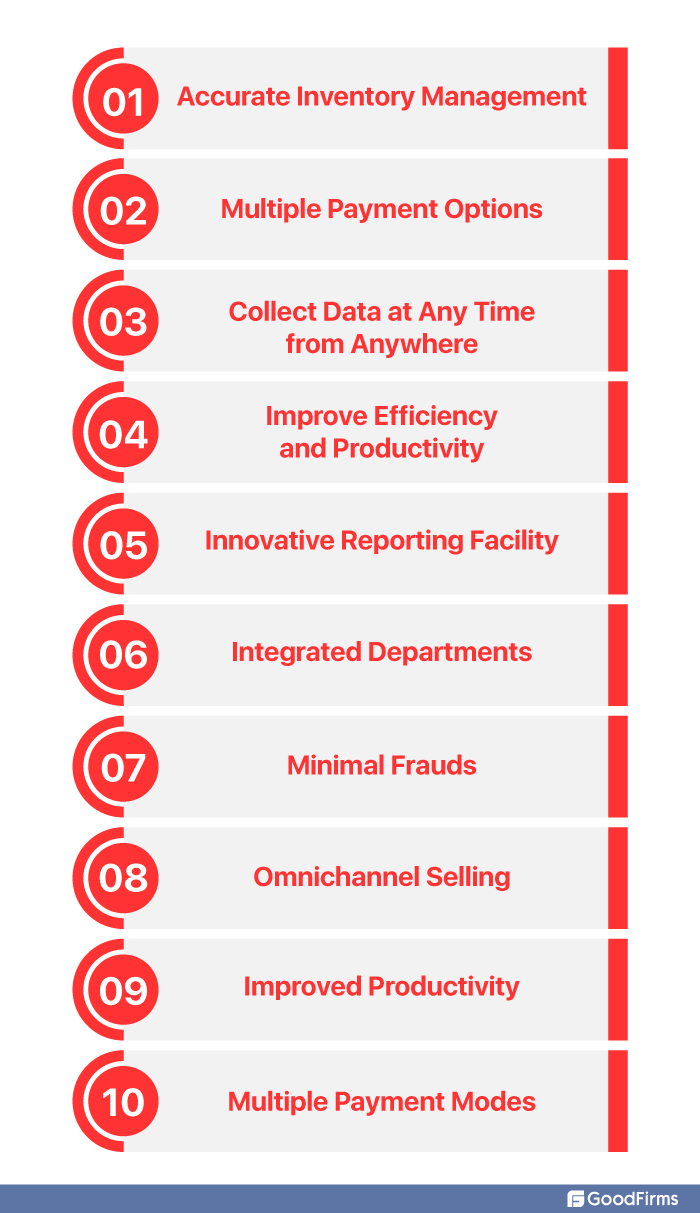
Accurate Inventory Management
Integrating an IoT-enabled POS system helps update the inventory automatically as soon as the product is sold, returned, or out of stock. It also processes transactions, collects payments, and updates the information in the inventory count. Integrating an IoT-powered POS can give access to the data at the fingertips. It maintains accuracy and helps you in running your retail business efficiently.
Multiple Payment Options
Accepting multiple payment options is another way of driving sales of your retail business. Since the pandemic, the use of contactless payments has increased significantly. It's also a convenient option for customers when multiple payment options are available as per their choice. When businesses deploy such innovative POS systems in their retail business, it builds loyalty and drives customer engagement.
Collect Data at Any Time from Anywhere
An IoT-integrated POS system allows access to centralized and updated information on a real-time basis. Whether at your office or home, you can get the latest insights on sales, updated inventory, and analytics reports of the retail business. It also helps in redefining customer experiences and marketing strategies for the business.
Improve Efficiency and Productivity
One of the many primary goals of the retail business is to save time and money. An IoT-powered POS system facilitates flexibility and mobility in collecting payments from anywhere, thus saving time for both employees and customers. It boosts efficiency within the system for the tasks like calculating the inventory, sales, and data of export and import of goods. With the integration of the intelligent POS system, the tasks will require minimal effort, thereby saving time and labor costs.
Innovative Reporting Facility
Having a brief idea of where your retail business is heading is vital. An IoT-powered POS system has an in-built intelligent reporting facility that will provide you with the latest statistics on the business. The analytics report can assist in making wise decisions concerning sales and marketing strategies. It can generate reports related to inventory, customer experience, loyalty programs, sales, payment processes, and other dimensions of the business. Besides generating smart and personalized reports, it can also give you a peek into which products are best-selling, the best hours of operation, and other insights that help in planning successful marketing campaign strategies.
Integrated Departments
The IoT-powered POS system keeps all the departments interconnected and all employees on the same page. It decreases the multiple tasks of updating the status of products, prices, and inventory. Once you have installed the modern POS system, it is possible to access and update the data from anywhere and on any device. It makes it error-free and provides accurate results.
Minimal Frauds
The constant fear of fraud and risks lingers in the retail business's background. Often the employees have to face the consequences, or sometimes businesses incur losses. Using an IoT-powered POS system provides a secure shopping and payment environment with minimal risks and fraud.
Omnichannel Selling
COVID-19 brought a revolution, especially to the retail industry. As people became wary of stepping out and started following social distance, there was a rise in online shopping. It offers incredible convenience with a few taps on the smart device, and the product gets delivered to the doorstep. To stay competitive, the brick-and-mortar stores also worked towards establishing their online presence. A smart POS system integrated with eCommerce software helped retailers have multiple stores online and offline to centralize their data and sell without any errors. having multiple stores online and offline
Improved Productivity
What if the POS system is not integrated with the payment gateway and other departments? Information silos occur whenever there's a product sale or return, resulting in error and mismanagement. Overall, the process becomes very time-consuming, and employees can sometimes miss out on a few transactions here and there. To prevent this, the IoT POS system comes to the rescue, supporting the retail business by easily centralizing the information accessible to all employees.
Multiple Payment Modes
With the new technologies coming into existence, the IoT-powered system offers a range of payment options. Customers have started using online payment options and digital wallets. It is a tech-savvy option that saves time from standing in the queue. There's no fixed payment method for customers to select during checkout. All of this becomes possible due to IoT-powered POS systems and their ability to collect different payment modes.
Below-mentioned are some trends that are likely to increase the demand for next-generation POS systems.
Latest Trends in Next-Generation POS Systems
Artificial Intelligence
The technology world is transforming and going beyond human capabilities. Artificial Intelligence (AI) is one of them. With the innovation of the AI-enabled POS system, the retail business will be able to analyze copious amounts of data. It can arrive at a valuable decision from the available insights.
An essential concern in the retail industry is payment security. An AI-enabled POS system integration prevents fraudulent activities, blocks suspicious transactions, and highlights loyal customers. To sum it up, AI-integrated POS systems will upgrade the experience for the retail business and customers.
Beacons
With mobile payments, the customer has to download the payment application and provide the debit/credit card details or bank information. Upon entering the store, the customer will launch the payment application, and the cashier scans it. With a few taps, the user will select the payment mode and send money for the purchase. With Beacons integration in the POS system, the above process becomes easy. Beacon connects you with the POS terminal regardless of your location inside or outside the store. This helps in reducing the customer waiting time ultimately improving sales and revenue generation.
RFID
Radio Frequency Identification (RFID) helps retailers completely control the purchase cycle. It might be the first innovation of a POS system that removes the barcode scanning process at the checkout counter. It directly processes the transactions through the customer's credit/debit card, mobile payment option or any other contactless payment mode.
Contactless Payment Gateway
The pandemic made us think about how we shop. It has motivated individuals to opt for a contactless payment gateway through mobile phones and debit/credit cards with a single tap. A smart POS system renders excellent support in preventing the spread of viruses. The system comprises a cheap card reader or a QR code scanner compatible with the contactless payment gateway.
An intelligent POS system also has an advanced payment option with unique security features. It protects the data and prevents cyber criminals and fraudsters from hacking your information.
Digital Stores
As much as offline stores play a crucial role in the retail business, opening digital stores is becoming a need of the hour. Businesses are opting for websites, web applications, and retail management software to portray their products and integrate them with offline stores through omni channel POS systems. The revenue generation improves as customers can check reviews from online stores and then purchase from offline stores and vice versa.
Conclusion
Thus, to succeed in this challenging post-pandemic era, retailers need to adapt to the latest technology, strategies, choices, operation models, and every other aspect that makes the business successful. Integrating IoT with POS is a smart choice as that helps you run a successful retail business. From touch screen displays, and smart shelves to automatic payment processes - IoT-powered POS systems are here to stay and bring revolution to the retail industry. Don’t forget to check this list of the best POS software and make the right purchasing decisions for your business.

